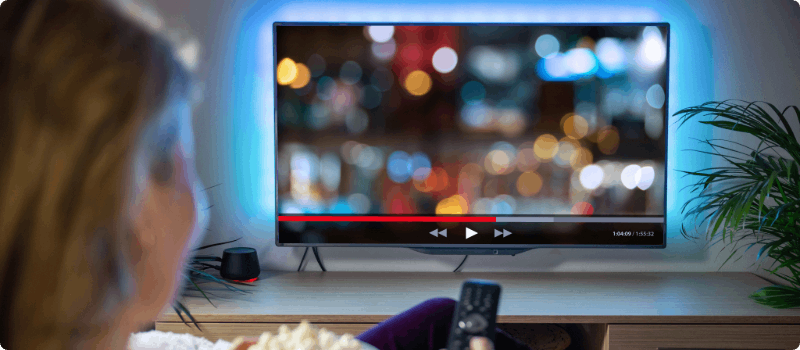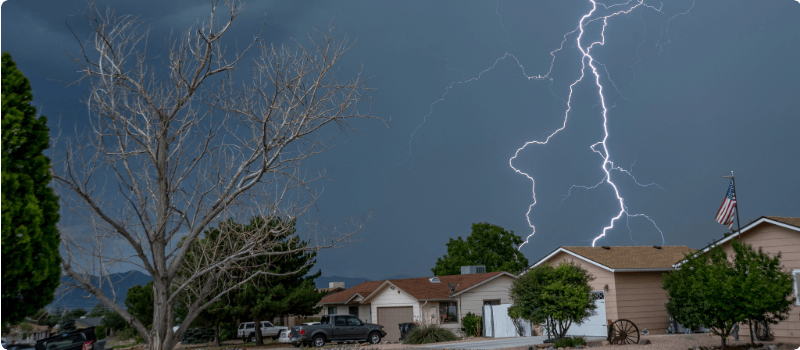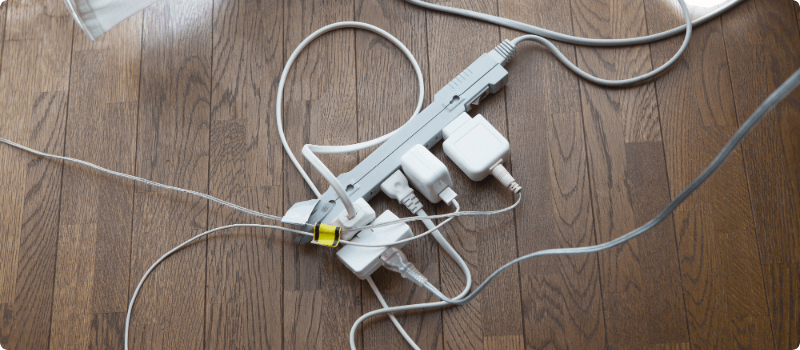
Renters Insurance Coverage & Electronics
Updated November 20, 2020 . AmFam Team
Whether you’re a gamer, a collectibles connoisseur or have a home office, your electronics are an important — and often expensive — part of your life. Because of this, you may be wondering if your renters insurance will cover your electronics should the unexpected happen.
We’ll help break down just what kind of coverage your renters insurance policy provides for your electronics so you can understand how your policy works for you.


What types of electronics does renters insurance cover?
Generally speaking, almost all consumer electronics are covered under renters insurance. Items like your TVs, your home computers and video game consoles are covered by the personal property provisions of your renters insurance policy.
Vintage electronics could be covered, but because the value to replace them could be more than your coverage allows, be sure to get your collection appraised so you know how much coverage you need.
When the value of the things you own exceeds the coverage limits in your renters policy, you’ve got options. Reach out to your agent to get a quote on scheduled personal property coverage. It allows you to list, or schedule, high value items individually.

Does renters insurance cover a broken tv?
The short answer? It depends. Most renters claims for broken smart TVs (or any other type) are typically denied. If the damage is due to your own negligence, it may not be covered. A covered loss is defined as damage that’s listed as a covered peril in your renters policy.
However, if a fire broke out in your kitchen and destroyed a nearby TV, you may be able to file a claim to replace it — because you’re likely covered for fire damage to personal property.
You may be wondering, “does renters insurance cover TV damage when it no longer works?” Much like homeowners insurance, when TVs stop working due to normal wear and tear, you likely won’t be able to file a claim to replace it.
To better protect your personal property, consider adding equipment breakdown coverage — it’s an additional layer of protection that helps cover the costs when items you own are damaged due to mechanical, electrical or pressure systems breakdown.

Does renters insurance cover lightning damage to electronics?
If lightning struck your building and sent a surge of high voltage through your rental unit, resulting in a gaming console or stereo system that no longer works, you’ll probably be covered after meeting your policy’s deductible.
Now, does renters insurance cover lightning strikes if the equipment is not operating correctly afterwards? It may. The damage does not have to destroy your electronics to be covered. Sometimes only a few components require replacement. File a claim, and we may be able to help make your expensive electronic investments right again.
Does renters insurance cover lightning strike damage to built-in appliances owned by your property manager? No, it doesn't. Refrigerators, dishwashers, microwave ovens and other electronic items that are the property of your landlord are not covered under your renters policy. You’ll need to reach out to them for repairs or replacement.

Does renters insurance cover computer damage?
One more time with the short answer? It depends. Like other electronics claims, renters insurance coverage for computer damage all hinges on how the damage occurred. Renters insurance computer coverage kicks in if your computer stops working in the event of a covered loss.
And renters insurance covers you in the event your property’s been stolen, too. So, if someone breaks your secured storage locker and makes off with your mountain bike, you’ll probably be allowed to file a claim for the losses. However, if your bike’s frame breaks after years of use, you probably won’t be covered for that loss.
The same applies to your tech. Does renters insurance cover computer damage that's the result of normal wear and tear? No, it doesn't. Personal property claims are covered per your policy’s list of covered losses, and wear and tear is not on that list.

Does renters insurance cover electrical damage?
It can, but there are a few important things to keep in mind. If the electrical damage is the result of a power surge, you’ll likely be covered. For instance, when electricity is restored after a power outage and a surge races through your rental’s electrical system, you will likely be covered for the repair or replacement costs of personal property that’s damaged or destroyed, subject to your policy’s deductible.
Does renters insurance cover electronics that no longer work because of intentional damage? No. If you throw your video game controller at your 4K smart tv, and the screen is destroyed as a result, losses that occur due to something you’ve done on purpose are not going to be covered.

What electronics are not covered by renters insurance?
While most consumer electronics are covered by your renters policy, there are a few scenarios in which your electronics may not be covered by your policy:
Electronics That Are Illegal to Own or Are Being Used for Illegal Purposes
For example, if you are in a state that has not legalized personal ownership or growth of marijuana and own grow lights for your personal marijuana plant, they would not be covered by your renters insurance, if they were damaged or stolen.
Some coverage is offered in states where personal cultivation of marijuana is legal, but be sure to check with your agent, as coverage can vary according to where you live.
Property and Electronics Owned by a Business
Suppose your employer assigns you a laptop to use when working from home which you take to a coffee shop, occasionally. If that laptop is damaged beyond repair or stolen, it's your employer who may be responsible for replacing it because they issued it to you. Your renters policy typically covers personal property you own.
On the other hand, if your personal laptop that you purchased was damaged or destroyed due to a peril named in your policy, your renters coverage would likely allow you to file a claim.

When are my electronics covered by renters insurance?
If your electronics are stolen or damaged in a covered event, either in your rental unit or while you’re out and about with them, they’ll be covered by your policy. Some of these types of losses include:
Fire and Smoke Damage
If there’s a fire in your apartment and your electronics are damaged, either by the fire itself or by smoke residue, your renters insurance policy can help cover the expense to replace these items.
Vandalism and Theft
Renters insurance policies may cover the cost of replacing items after they’re stolen or damaged as a direct result of vandalism. This generally includes items that were stored in your car, on your person or the things you bring with you while traveling. Restrictions typically apply to vandalism claims, so be sure to check in with your agent about how your coverage works.

When are my electronics not covered by renters insurance?
Depending on your renters policy, there may be events that aren’t covered by your insurance.
Here are examples of damage to electronics that are not covered under a typical renters insurance policy:
- Damage from flooding
- Earthquakes
- Pests
If you’re worried about events like those above damaging your electronics, you may want to consider talking to your insurance agent about adding a special endorsement to your policy — or even purchasing a separate flood policy — to better protect your things from losses that aren’t covered under a standard renters policy.

How much coverage do my electronics have?
Your renters insurance has a personal property coverage limit, which is what your insurance will cover up to a set amount of money, after paying your deductible. Keep in mind, your renters insurance will typically replace your items for their actual cash value, which means you’ll be compensated for what your electronics are worth today, not when you bought them.
In order to know just how much coverage you need to best protect your electronics, you’ll need to calculate their value. You can do this with our printable home inventory spreadsheet. It includes sections for your various types of expensive belongings, so you can get a complete picture of your coverage needs.

How can I increase my electronics coverage?
Connect with your American Family Insurance agent to discuss increasing your personal property coverage, to better protect your finances from the loss of your electronics. They can help get your renters insurance customized for your needs to help you protect what matters most.

Learn More About Personal Property Insurance
You’ve invested a lot of time and money selecting the expensive electronics you depend on every day. Be sure to reach out to your American Family Insurance agent and get them a full list of these and other expensive items you keep in your rental, or storage space. You’re going to find more peace of mind with affordable coverage that protects your personal electronics property better than before.
This article is for informational purposes only and based on information that is widely available. This information does not, and is not intended to, constitute legal or financial advice. You should contact a professional for advice specific to your situation.
This information represents only a brief description of coverages, is not part of your policy, and is not a promise or guarantee of coverage. If there is any conflict between this information and your policy, the provisions of the policy will prevail. Insurance policy terms and conditions may apply. Exclusions may apply to policies, endorsements, or riders. Coverage may vary by state and may be subject to change. Some products are not available in every state. Please read your policy and contact your agent for assistance.
Tools & Resources
NextScripts
JSS component is missing React implementation. See the developer console for more information.

